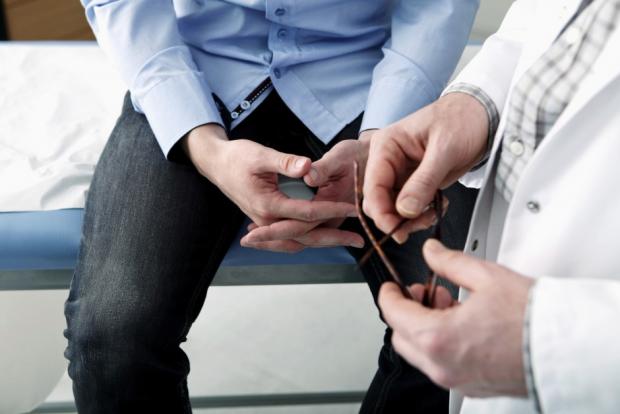Contents:
- Medical Video: Signs and Symptoms of Prostate Cancer - A Physician's and Patient's Perspective | Dr. Mark Litwin
- What are the symptoms of prostate cancer?
- Symptoms of early prostate cancer
- Symptoms of prostate cancer that have spread
- How do doctors diagnose prostate cancer?
- How to prevent prostate cancer
Medical Video: Signs and Symptoms of Prostate Cancer - A Physician's and Patient's Perspective | Dr. Mark Litwin
The possibility of getting prostate cancer is one in seven, and this disease can occur at any time during your life.Although, prostate cancer does not cause early signs, many men experience symptoms of prostate cancer associated with disorders of the prostate gland. Knowing the characteristics and early symptoms of prostate cancer can help early diagnosis and increase the chances of recovery.
What are the symptoms of prostate cancer?
Although most cases of prostate cancer do not cause serious health problems, a small percentage of these diseases can be very serious. The most common problem in men with serious prostate cancer is seen when urinating.
Symptoms of early prostate cancer
Signs that you might experience if you have prostate cancer are:
- changes in urination habits, such as having to urinate frequently, especially at night
- strong urge to urinate
- it is difficult to start or stop the flow of urine
- unable to urinate
- weak or reduced urine flow
- broken urine flow
- feeling that the bladder is not completely empty
- burning or pain when urinating
- blood in the urine (hematuria) or semen
- pain during ejaculation
Symptoms of prostate cancer that have spread
Signs and symptoms caused by cancer that grow larger or have spread to other parts of the body and organs, are:
- bone pain (especially on the back, waist, thighs or neck)
- weight loss
- fatigue
- low red blood cell count (anemia)
- weakness or numbness in the legs or feet
- loss of control of urination or large
The signs and symptoms of prostate cancer can also be caused by other health conditions. Therefore, it is important to check for unusual symptoms with the doctor.
In addition to being alert to signs of prostate cancer, you should take a cancer screening test regularly. If cancer is suspected, the team of doctors will confirm whether there is a tumor or not, and include what type of cancer it is. The diagnosis process can seem long and frustrating, but it is important for doctors to eliminate the possible causes of other health problems before making a cancer diagnosis.
How do doctors diagnose prostate cancer?
There are several ways for doctors to make a diagnosis if you have prostate cancer:
- Medical history and physical examination: the doctor will check for signs of prostate cancer and ask questions about family history.
- Digital rectal examination (DRE): the doctor inserts his finger into the rectum to feel the prostate gland through the rectal wall.
- Prostate-specific antigen test (PSA): done to measure PSA levels — proteins produced by the prostate.
- Ultrasound transectum (TRUS): uses an ultrasound probe that is inserted into the rectum to make the prostate image.
- Biopsy: used to diagnose prostate cancer. Prostate biopsy can be done if an abnormality is found in DRE or ultrasound transectum. This method can also be done if the PSA level is too high for the man's age or has increased over time or increased rapidly.
- Complete blood count (CBC): measure the amount and quality of red blood cells, white blood cells and platelets.
- Blood chemistry test: measure certain chemicals in the blood. This test shows how well certain organs function and can also be used to detect abnormalities.
- Bone scan: use radioactive bone-searching materials (radiopharmaceuticals) and computers to produce bone images to check whether prostate cancer has spread to the bone.
How to prevent prostate cancer
Prostate cancer can be prevented by a good lifestyle choice, namely a low-fat diet. Foods containing fat include meat, nuts, oil and dairy products, such as milk and cheese.
Eat more fat from plants than animals. In studies that examined fat consumption and prostate cancer risk, animal fat was more likely to be associated with an increased risk of prostate cancer. Animal products that contain fat include meat, lard, and butter.
Eat fish. Fatty fish — like salmon, tuna, and herring — contain omega-3 fatty acids, a type of fatty acid that has been linked to a reduced risk of prostate cancer. If you don't currently eat fish, consider adding it to your diet. Another way to add omega-3 to your diet is to consume flaxseed.
Reduce the amount of milk products you consume every day. In the study, men who consumed the most dairy products — such as milk, cheese and yogurt — each day had the highest risk for prostate cancer. However, the risks associated with dairy products are not expected to be large.
If your weight is healthy, try to maintain it by exercising several times a week and choosing a healthy diet rich in fruits, vegetables, and whole grains. Exercise can help you maintain weight or lose weight. Men who are obese are more at risk for prostate cancer
Sports-related studies and the risk of prostate cancer most often show that men who exercise can have a reduced risk of prostate cancer. In addition, exercise provides many other health benefits and can reduce the risk of heart disease and other cancers.
Hello Health Group does not provide medical advice, diagnosis or treatment.












